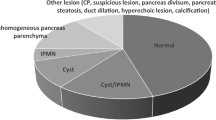Abstract
In the early years of my GI fellowship, a healthy 40-year-old man came to my clinic and announced that he was going to die of pancreatic cancer. His brothers, father and uncles had all died of the disease; he felt his fate was inescapable. I asked whether his family members had seen doctors or had any tests. His answer was yes to both. Even so, doctors could not diagnose the pancreatic cancer at early stages. CT scans were always negative. I thought to myself, in order to help this patient—CT scans may not be reliable for early detection. Perhaps other methods of imaging the pancreas might be of more benefit. This patient opened a door that led to a 30-year journey of trying to detect pancreatic cancer at earlier stages when it is curable.
Similar content being viewed by others
Data availability
No datasets were generated or analysed during the current study.
References
Evans JP, Burke W, Chen R et al (1995) Familial pancreatic Adenocarcinoma: Association with diabetes and exocrine insufficiency and early molecular diagnosis. J Med Genet 32:330–335
Brentnall TA, Bronner MP, Byrd DR, Haggitt RC, Kimmey MB (1999) Early diagnosis and treatment of pancreatic dysplasia in patients with a family history of pancreatic cancer. Ann Intern Med 131:247–255
Canto MI, Harinck F, Hruban RH et al (2013) International Cancer of the pancreas Screening (CAPS) Consortium summit on the management of patients with increased risk for familial pancreatic cancer. Gut 62:339–347
Gonda TA, Everett JN, Wallace M et al (2021) Recommendations for a more Organized and Effective Approach to the early detection of pancreatic Cancer from the PRECEDE (pancreatic Cancer Early Detection) Consortium. Gastro 161:1751–1757
MacDermott RP, Kramer P (1973) Adenocarcinoma of the pancreas in four siblings. Gastro 65:137–139
Longnecker DS (1994) Preneoplaastic lesions of the exocrine pancreas. Int J Pancreatol 16:201–204
Pour PM, Sayed S, Sayed G (1982) Hyperplastic, preneoplastic and neoplastic lesions found in 83 human pancreases. Am J Clin Pathol 77:137–152
Cubilla AL, Fitzgerald PJ (1976) Morphological lesions associated with human primary invasive nonendocrine pancreas cancer. Cancer Res 36:2690–2698
Brat DJ, Lillemoe KD, Yeo CJ, Warfield PB, Hruban RH (1998) Progression of pancreatic intraductal neoplasia to infiltrating adenocarcinoma of the pancreas. Am J Surg Pathol 22:163–169
Hruban RH, Rustgi AK, Brentnall TA, Tempero MA, Wright CV, Tuveson DA (2006) Pancreatic cancer in mice and man: the Penn Workshop 2004. Cancer Res 66:14–17
Basturk O, Hong SM, Wood LD et al (2015) A revised classification system and recommendations from the Baltimore Consensus Meeting for neoplastic precursor lesions in the pancreas. Am J Surg Pathol 39:1730–1741
Rulyak SJ, Kimmey MB, Veenstra D, Brentnall TA (2003) Cost-effectiveness of pancreatic Cancer Screening in Familial Pancreatic Cancer kindreds. Gastrointest Endosc 57:23–29
Corral JE, Das A, Bruno MJ, Wallace MB (2019) Cost-effectiveness of pancreatic cancer surveillance in high-risk individuals. Pancreas 48:526–536
Ibrahim IS, Vasen HFA, Wasser MNJM et al (2023) Cost effectiveness of pancreas surveillance: the CDKN2A-p16-Leiden cohort. United Eur Gastroenterol J 11:163–170
Aslanian HR, Lee JH, Canto MI (2020) AGA clinical practice update on pancreas cancer screening in high-risk individual: Expert review. Gastro 159:358–362
Drohan B, Roche CA, Cusack JC, Hughes KS (2012) Hereditary breast and ovarian Cancer and other Hereditary syndromes: using Technology to identify carrier. Ann Surg Onc 19:132–137
Goggins M, Overbeek KA, Brand R et al (2020) Management of patient with increased risk for familial pancreatic cancer: updated recommendation from the International Cancer of the pancreas Screening (CAPS) Consortium. Gut 69:7–17
Rulyak SJ, Lowenfels AB, Maisonneuve P, Brentnall TA (2003) Risk factors for the development of pancreatic cancer in familial pancreatic cancer kindreds. Gastro 124:1291–1299
Matubayashi H, Maeda A, Kanemoto H et al (2011) Risk factors of familial pancreatic cancer in Japan: current smoking and recent onset diabetes. Pancreas 40:974–978
Pepe MS, Feng Z, Janes H, Bossuyt PM, Potter JD (2008) Pivotal evaluation of the Accuracy of a Biomarker used for classification or prediction: standards for Study Design. J Natl Cancer Inst 100:1432–1438
Brand RE, Persson J, Bratlie SO et al (2022) Detection of early-stage pancreatic ductal adenocarcinoma from blood samples: results of a Multiplex Biomarker signature validation study. Clin Transl Gastroenterol 13:e00468
Vasen H, Ibrahim I, Ponce CG et al (2016) Benefit of surveillance for pancreatic cancer in high-risk individuals: outcome of long-term prospective follow-up studies from three European expert centers. J Clin Oncol 34:2010–2019
Canto MI, Kerdsirichairat T, Yeo CJ et al (2020) Surgical outcomes after pancreatic resection of screening-detected lesions in individuals at high risk for develo** pancreatic cancer. J Gastrointest Surg 24:1101–1110
Abboud Y, Samaan JS, Oh J et al (2023) Increasing pancreatic Cancer incidence in Young women in the United States: a Population-Based Time-Trend Analysis, 2001–2018. Gastro 164:978–989
Author information
Authors and Affiliations
Contributions
TAB wrote the text and reviewed the manuscript.
Corresponding author
Ethics declarations
Competing interests
The authors declare no competing interests.
Additional information
Publisher’s Note
Springer Nature remains neutral with regard to jurisdictional claims in published maps and institutional affiliations.
Rights and permissions
Springer Nature or its licensor (e.g. a society or other partner) holds exclusive rights to this article under a publishing agreement with the author(s) or other rightsholder(s); author self-archiving of the accepted manuscript version of this article is solely governed by the terms of such publishing agreement and applicable law.
About this article
Cite this article
Brentnall, T.A. Familial pancreatic cancer: a long fruitful journey. Familial Cancer (2024). https://doi.org/10.1007/s10689-024-00364-5
Received:
Accepted:
Published:
DOI: https://doi.org/10.1007/s10689-024-00364-5




